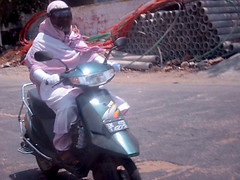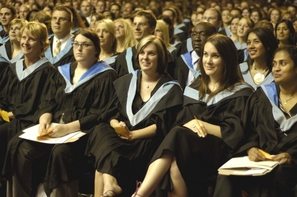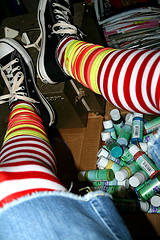The System is not made for me. Graduate students are not supposed to have families to care for, houses to clean, meals to prepare and clean up, or groceries to buy. They are not supposed to organize birthday parties, coordinate repairs, clean and sell a house, finish a basement, wash laundry, fold laundry, garden, or cut lawns. I need someone to do all these things for me. (*edit: Can I also add that this person must care for the physical and emotional health of all members of the family, including me? And let me tell you, grad students are Needy.)
Graduate students are supposed to read, research, think, discuss, write, present, read, research, think, etc ad infinitum. My job should be to go to school then come home and study in isolation, with occasional breaks for midnight rollerblading and Chinese takeout. It’s supposed to be a lot of work, but it’s supposed to be doable.
For some crazy reason, maybe because I managed an undergraduate degree with small children around, I thought I could do this too. It’s been an interesting month and a half — maybe because of the fun I’ve been having with family law court, police, children’s aid, and counsellors (could another agency possibly be interested in my life?). Somehow I think that even if my life were stable, with no drama or crises, it would still be too much to be a grad student and mother.
I met a 4th year student yesterday who is married, planning to do the MA next year. He’s only a few years younger than me — in his early 30s. His wife lives one and a half hours away, he has an apartment here… he has a kid that doesn’t live with him and she has 3 kids — but they’re her kids, not his. Because they are her kids, according to their arrangement, there’s no need for him to be there. He’s focused on one part of his life — school.
I don’t have that option. My identities are completely interlocked. I’m not a student from 9-5 and a mother from 5-9 and a partner from 9-midnight. I cannot separate out one piece of my self and put the rest on pause or say they are insignificant or disposable. I am all of me. Like it says in my bio on this site: I am a feminist-activist-artist-geek-parent-student. I am all of these things at once. I can do what I do because of all of these things. The skills that I have, the insight that I bring, I bring because of these multi-dimensions.
Alas, the Institution of Academia is not made for real people. To receive funding I must be a full-time student. The perception is that unless I am full-time, I am not a serious researcher, that maybe I have a job somewhere. Maybe it’s time (or past time) for Academia to realize that there are other responsibilities in a person’s life and that these other things do not preclude people from making contributions to the Academy.
As long as the system runs as is, the only people in academia will be the ones that fit the mold: young people, no family responsibilities, no primary childcare responsibilities. Hmmm sound familiar? This is going to be a problem because more and more people want undergraduate degrees and there aren’t enough good teachers to fill the roles. By excluding a woman like me from academia, a good potential educator and researcher is lost. There has got to be a change. Maybe more distance education options, maybe a part-time option with funding. It’s sad to think I may have to give this up because the logistics are beyond me.
 Comments(3)
Comments(3)



